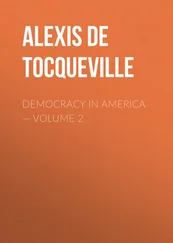Alexis de Tocqueville - American Institutions and Their Influence
Здесь есть возможность читать онлайн «Alexis de Tocqueville - American Institutions and Their Influence» — ознакомительный отрывок электронной книги совершенно бесплатно, а после прочтения отрывка купить полную версию. В некоторых случаях можно слушать аудио, скачать через торрент в формате fb2 и присутствует краткое содержание. Жанр: foreign_antique, Политика, foreign_edu, на английском языке. Описание произведения, (предисловие) а так же отзывы посетителей доступны на портале библиотеки ЛибКат.
- Название:American Institutions and Their Influence
- Автор:
- Жанр:
- Год:неизвестен
- ISBN:нет данных
- Рейтинг книги:5 / 5. Голосов: 1
-
Избранное:Добавить в избранное
- Отзывы:
-
Ваша оценка:
- 100
- 1
- 2
- 3
- 4
- 5
American Institutions and Their Influence: краткое содержание, описание и аннотация
Предлагаем к чтению аннотацию, описание, краткое содержание или предисловие (зависит от того, что написал сам автор книги «American Institutions and Their Influence»). Если вы не нашли необходимую информацию о книге — напишите в комментариях, мы постараемся отыскать её.
American Institutions and Their Influence — читать онлайн ознакомительный отрывок
Ниже представлен текст книги, разбитый по страницам. Система сохранения места последней прочитанной страницы, позволяет с удобством читать онлайн бесплатно книгу «American Institutions and Their Influence», без необходимости каждый раз заново искать на чём Вы остановились. Поставьте закладку, и сможете в любой момент перейти на страницу, на которой закончили чтение.
Интервал:
Закладка:
But as it was foreseen, that, in practice, questions might arise as to the exact limits of this exceptional authority, and that it would be dangerous to submit these questions to the decision of the ordinary courts of justice, established in the states by the states themselves, a high federal court was created, 125 125 The action of this court is indirect, as we shall hereafter show.
which was destined, among other functions, to maintain the balance of power which had been established by the constitution between the two rival governments. 126 126 It is thus that the Federalist, No. 45, explains the division of supremacy between the union and the states: "The powers delegated by the constitution to the federal government are few and defined. Those which are to remain in the state governments are numerous and indefinite. The former will be exercised principally on external objects, as war, peace, negotiation, and foreign commerce. The powers reserved to the several states will extend to all the objects which, in the ordinary course of affairs, concern the internal order and prosperity of the state." I shall often have occasion to quote the Federalist in this work. When the bill which has since become the constitution of the United States was submitted to the approval of the people, and the discussions were still pending, three men who had already acquired a portion of that celebrity which they have since enjoyed, John Jay, Hamilton, and Madison, formed an association with the intention of explaining to the nation the advantages of the measure which was proposed. With this view they published a series of articles in the shape of a journal, which now form a complete treatise. They entitled their journal, "The Federalist," a name which has been retained in the work. The Federalist is an excellent book, which ought to be familiar to the statesmen of all countries, although it especially concerns America.
PREROGATIVE OF THE FEDERAL GOVERNMENT
Power of declaring War, making Peace, and levying general Taxes vested in the Federal Government.—What Part of the internal Policy of the Country it may direct.—The Government of the Union in some respects more central than the King's Government in the old French monarchy.
The external relations of a people may be compared to those of private individuals, and they cannot be advantageously maintained without the agency of the single head of a government. The exclusive right of making peace and war, of concluding treaties of commerce, of raising armies, and equipping fleets, was therefore granted to the Union. 127 127 See constitution, sect. 8. Federalist, Nos. 41 and 42. Kent's Commentaries, vol. i., p. 207. Story, pp. 358-382; 409-426.
The necessity of a national government was less imperiously felt in the conduct of the internal affairs of society; but there are certain general interests which can only be attended to with advantage by a general authority. The Union was invested with the power of controlling the monetary system, of directing the post-office, and of opening the great roads which were to establish communication between the different parts of the country. 128 128 Several other privileges of the same kind exist, such as that which empowers the Union to legislate on bankruptcy, to grant patents, and other matters in which its intervention is clearly necessary.
The independence of the government of each state was formally recognized in its sphere; nevertheless the federal government was authorized to interfere in the internal affairs of the states 129 129 Even in these cases its interference is indirect. The Union interferes by means of the tribunals, as will be hereafter shown.
in a few predetermined cases, in which an indiscreet abuse of their independence might compromise the security of the Union at large. Thus, while the power of modifying and changing their legislation at pleasure was preserved in all the republics, they were forbidden to enact ex post facto laws, or to create a class of nobles in their community. 130 130 Federal Constitution, sect. 10, art. 1.
Lastly, as it was necessary that the federal government should be able to fulfil its engagements, it was endowed with an unlimited power of levying taxes. 131 131 Constitution, sect. 8, 9, and 10. Federalist, Nos. 30-36 inclusive, and 41-44. Kent's Commentaries, vol. i., pp. 207 and 381. Story pp. 329 and 514.
In examining the balance of power as established by the federal constitution; in remarking on the one hand the portion of sovereignty which has been reserved to the several states, and on the other the share of power which the Union has assumed, it is evident that the federal legislators entertained the clearest and most accurate notions on the nature of the centralisation of government. The United States form not only a republic, but a confederation; nevertheless the authority of the nation is more central than it was in several of the monarchies of Europe when the American constitution was formed. Take, for instance, the two following examples:—
Thirteen supreme courts of justice existed in France, which, generally speaking, had the right of interpreting the law without appeal; and those provinces, styled pays d'etats , were authorized to refuse their assent to an impost which had been levied by the sovereign who represented the nation.
In the Union there is but one tribunal to interpret, as there is one legislature to make the laws; and an impost voted by the representatives of the nation is binding upon all the citizens.
In these two essential points, therefore, the Union exercises more central authority than the French monarchy possessed, although the Union is only an assemblage of confederate republics.
In Spain certain provinces had the right of establishing a system of customhouse duties peculiar to themselves, although that privilege belongs, by its very nature, to the national sovereignty. In America the congress alone has the right of regulating the commercial relations of the states. The government of the confederation is therefore more centralized in this respect than the kingdom of Spain. It is true that the power of the crown in France or in Spain was always able to obtain by force whatever the constitution of the country denied, and that the ultimate result was consequently the same; and I am here discussing the theory of the constitution.
FEDERAL POWERS
After having settled the limits within which the federal government was to act, the next point was to determine the powers which it was to exert.
LEGISLATIVE POWERS
Division of the legislative Body into two Branches.—Difference in the Manner of forming the two Houses.—The Principle of the Independence of the States predominates in the Formation of the Senate.—The Principle of the Sovereignty of the Nation in the Composition of the House of Representatives.—Singular Effects of the Fact that a Constitution can only be Logical in the early Stages of a Nation.
The plan which had been laid down beforehand for the constitution of the several states was followed, in many points, in the organization of the powers of the Union. The federal legislature of the Union was composed of a senate and a house of Representatives. A spirit of conciliation prescribed the observance of distinct principles in the formation of each of these two assemblies. I have already shown that two contrary interests were opposed to each other in the establishment of the federal constitution. These two interests had given rise to two opinions. It was the wish of one party to convert the Union into a league of independent states, or a sort of congress, at which the representatives of the several peoples would meet to discuss certain points of their common interests. The other party desired to unite the inhabitants of the American colonies into one sole nation, and to establish a government, which should act as the sole representative of the nation, as far as the limited sphere of its authority would permit. The practical consequences of these two theories were exceedingly different.
Читать дальшеИнтервал:
Закладка:
Похожие книги на «American Institutions and Their Influence»
Представляем Вашему вниманию похожие книги на «American Institutions and Their Influence» списком для выбора. Мы отобрали схожую по названию и смыслу литературу в надежде предоставить читателям больше вариантов отыскать новые, интересные, ещё непрочитанные произведения.
Обсуждение, отзывы о книге «American Institutions and Their Influence» и просто собственные мнения читателей. Оставьте ваши комментарии, напишите, что Вы думаете о произведении, его смысле или главных героях. Укажите что конкретно понравилось, а что нет, и почему Вы так считаете.












